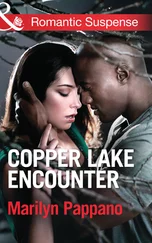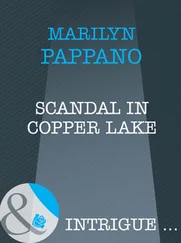Yeah, he’d gone to her apartment, gotten the key from the manager, let himself in and searched the place, but it had all been part of a missing-person investigation. Taylor had met him there, and they’d looked through her closet, her drawers, her cabinets. Taylor had made a list of the obvious things missing—some clothing, two suitcases, makeup and photographs—and then he’d asked Mitch to leave him. He’d wanted time alone in the apartment.
And Mitch had left. Separated or not, Jennifer was still Taylor’s wife. He’d feared the worst from the beginning. He’d been emotional. Though not too emotional this morning upon seeing her for the first time since he’d thought she’d died.
Mitch studied her, making no effort to hide it. She looked pretty damn good in a married-minivan-soccer-mom sort of way, but he liked her better in last night’s tight jeans and snug top. There was something entirely too demure about the over-the-knee skirt and the prissy top.
Seeing that she was married, estranged or not, he should find “demure” good. He shouldn’t be thinking that she needed to show more leg, more skin in general, or that she should only wear clothes that hugged her curves.
He shouldn’t be thinking about her as a woman at all.
“You don’t have much to say about your work, do you?” Jennifer asked. “Let’s try something else. Where do you come from? You’re obviously not from around here.”
“‘Obviously’?” he echoed cynically. “I lived in Belmar from the time I was nine until I went away to college. You’d think Taylor would have mentioned that.”
Her cheeks tinged a faint pink that quickly faded. “Taylor tells people what he wants them to know when he wants them to know it. All he ever said was, ‘Bubba and I go back a long way.’ With Taylor, that can mean a month or twenty years.”
“Twenty-four years, to be exact.”
That was an accurate description of Taylor, though. Hadn’t he talked to Mitch a half-dozen times after his wedding before he’d mentioned it? Even then, he’d been stingy with information. Jennifer Randall. From California. No one you’d know . Over the next couple years he’d offered little more: they’d met on a cruise; she’d taught grade school in California; she had an older sister; she wasn’t much of a cook.
Taylor liked holding his cards close.
“Does your family still live here?” she asked.
“They never did. I lived with my grandmother. She died while I was in college.”
“I’m sorry.” She sounded as if she meant it. “So where does your family live?”
“My mother’s in Colorado. My brothers live in Georgia.”
“And your father?”
“Died when I was nine.” The child-support checks had stopped coming, and his mother had sent him to her mother. It sounded an awful lot like abandonment but hadn’t felt that way. He’d liked his grandmother and she’d liked him. Living with her had been easy.
“So you came here, but your brothers didn’t. Were you a problem child?” She asked it with a wry smile that he couldn’t read. Because she was stating the obvious or because she didn’t really believe he’d been bad enough to send away?
He smiled thinly. “I was an illegitimate child. When the old man died, his sons—my half brothers—continued to live with their mother. My mother sent me here.”
Except for the monthly checks, his father had never acknowledged him. His brothers and their mother hadn’t known he existed until Sara had come across the record of those checks when settling his estate. She had invited Mitch for regular visits, given him time with his brothers and treated him more like a son than his own mother had. She had even asked him to live with them, but he’d chosen to stay with his grandmother. Even so, he considered Sara more family than his mother.
“I’m sorry,” Jennifer said again, and he realized he’d just told her more about himself than even Taylor knew. Not good.
“Why did you come back?”
He turned the question on her. “Why did you? Half the town was betting that the storm would be the shove you needed to leave Belmar and Taylor for good.”
“And what did you think?”
“I didn’t. Frankly it didn’t matter to me either way.” A lie. He’d been curious. Had thought it one hell of a waste if she was dead. Had hoped if she was alive, she was smart enough to stay gone. Had thought she deserved better than Taylor.
“You didn’t answer,” he reminded her. “Why did you come back?”
She poked her fork at the last bits of hash browns on the plate, then laid it down and pushed both away. “I had unfinished business here.”
Her only business in Belmar, unfinished or otherwise, was with Taylor. Settling matters between them? Divorce? Reconciliation? Revenge?
He figured Taylor’s interests lay more in line with revenge. People didn’t go without his say-so. If an officer decided to leave the department, Taylor fired him before he got the chance. Back in college, when word had gotten out that he was going to be cut from the football team, he’d quit first. He wouldn’t have liked that Jennifer had left him. He’d want to win her back, if for no other reason than so he could turn around and leave her .
Hey, no one had ever accused Taylor of maturity.
“You should have gone back to California with your sister,” Mitch said flatly.
She glanced at the check, then left a generous tip on the table before meeting his gaze again, hers straight, blue, steady. “Is that a threat, Officer Lassiter?”
He kept his gaze just as straight and steady. “Why, ma’am, I’m an officer of the law. I don’t make threats.”
Her snort showed just what she thought of that. His brief experience with the Belmar Police Department—two months and counting—supported her opinion.
There had to be some advantage to a job that paid what this one did, Billy Starrett often repeated.
He followed her to the counter, where she paid her ticket, then out the door. Her car was parked down the street; his was around the corner. She walked a few feet away, then turned back. “Remember—bank, post office, grocery store.” Then, with a smirk, she walked off.
Damn Taylor for giving him this order. Mitch had better things to do, things that actually fell under his job description. Using department assets to find out what the chief’s wife was up to wasn’t exactly appropriate. But, when compared to all the other inappropriate things going on within the department, this one didn’t begin to matter.
He climbed into his unit, switched the AC to high, then fastened his seat belt. He’d spent more years in a patrol car than he wanted to count at the moment. With a shotgun secured to the dash, a heavy-duty flashlight in the passenger seat, the radio, the computer and the extra handcuffs tossed onto the console, he felt comfortable here, more than anywhere else in Belmar.
There were three banks in town, but he didn’t have to guess which one Jennifer was going to. She tapped the horn as she drove past, just to make sure he didn’t miss her. She was entirely too accommodating about being watched to be up to anything. It promised to be a long, boring morning.
She went inside the bank and spent eleven minutes and got in and out of the post office, with a handful of mail, in six. Her next stop was the grocery store nearest the apartments. He parked behind her car and across the aisle and watched as she went in.
Ten minutes passed. Fifteen. The engine was running and so was the AC, but the temperature inside the car was steadily rising. Southern Mississippi was always hot and humid in September but seemed even more so that morning. Maybe it was Hurricane Leo, idling out in the gulf, deciding which way to blow. Maybe it was this assignment, being used as a babysitter—spy—on city time, that was making him hot. Or, hell, maybe it was the whole damn job.
Читать дальше












